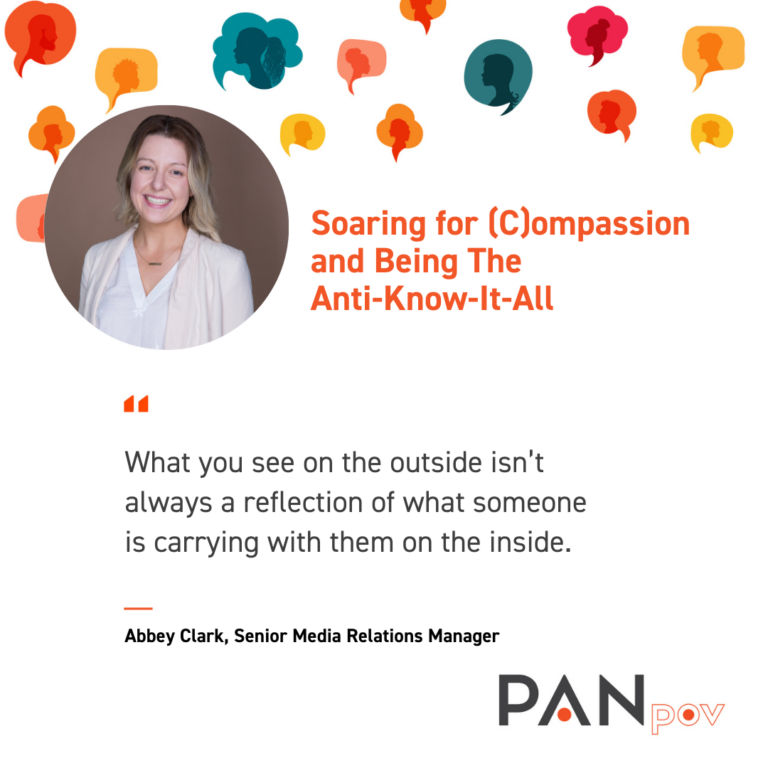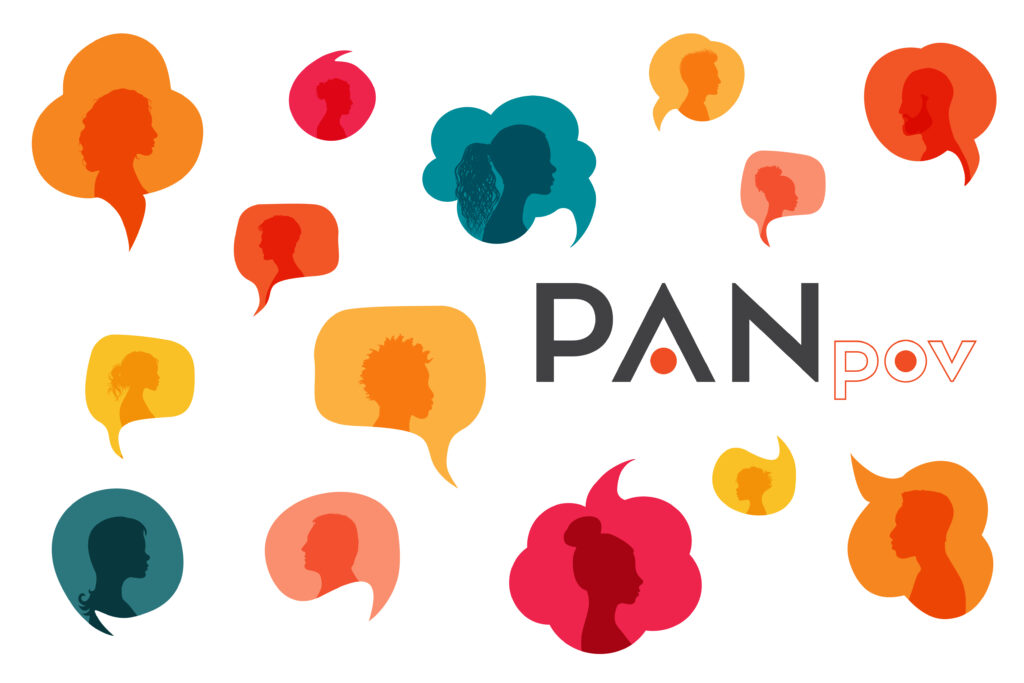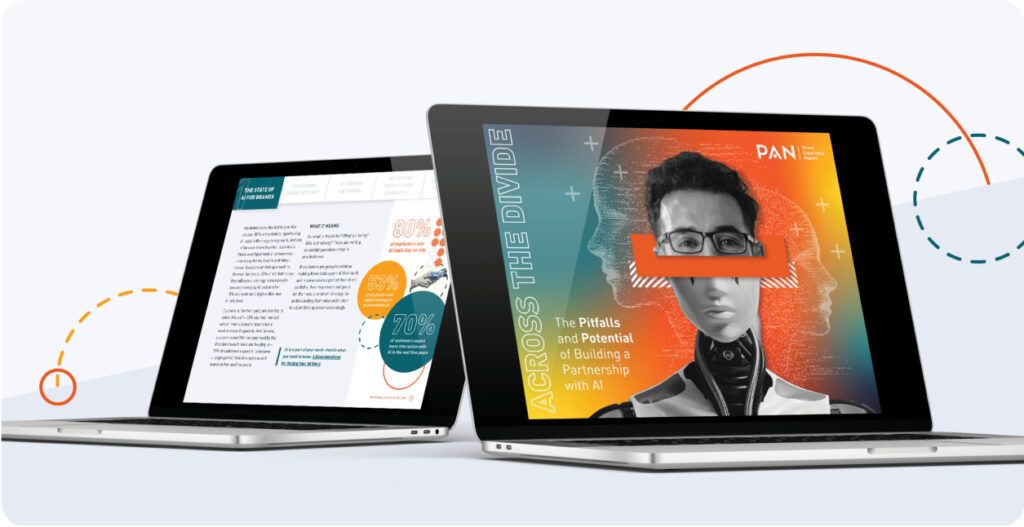This piece is part of our PANpov series — firsthand stories from employees about unique experiences they bring to integrated marketing, PR and communications. Read more.
Content warning: This article contains reference to self-harm. Click here to return to general content.
I am a white, cis-gender, straight woman (she/her). I live in a major Northeast city, Boston, and grew up middle class in a small town on Long Island, NY. So why exactly is my PANpov, without a doubt privileged and seemingly so ordinary, so important?
An experience that I have chosen to focus on for my PANpov is perhaps not so unique on the outside, but rather it’s something that many comms professionals experience on the inside and don’t talk about: I’m talking about the psychology of chasing perfection.
Growing up, I played sports, balanced athletics with a love for musical theatre and vocal performance, contributed to the school newspaper, was a straight-A student, tutored others for National Honor Society credits — you can imagine the type of kid I was. I built up my high school resume fast and furiously to attend a good college (while having fun, making friends, and enjoying high school for what it was — which by the way, many people can’t say this about their high school experience, and for this I feel lucky). In college, I was highly involved in student life (I even started a collegiate branch of a 501c3 women’s empowerment non-profit organization my senior year), I maintained a high GPA, and I graduated with pride for my experience at Boston College (BC) — all of this went on my resume for “the real world.”
I’ve historically strived for perfection and because of this, I’ve experienced imposter syndrome all my life. Imposter syndrome is defined as a condition of “feeling anxious and not experiencing success internally despite being high performing in external, objective ways.” A big phony, a fraud, full of self-doubt while you have others looking up to you, leaning on you, rooting for you. Being privileged doesn’t mean you don’t face relative adversity or have to work hard for what you have (because you absolutely do). It does however mean that I was presented opportunities because of my privilege that either weren’t available or were unknowingly available to others. I’m incredibly grateful for the opportunities I’ve been given to succeed.
Every time I experience imposter syndrome, I remember to take the same advice I give to my dedicateds/direct reports: “You don’t have to know everything, you just have to have the know-how.”
 If there’s one thing I’m good at, it’s having the know-how: being a sponge and soaking up new information and knowledge. It’s what I love most about my job — jumping into new accounts, new industries and being a problem solver. I am always learning something new. “If you’re the smartest one in the room, you’re in the wrong room,” right? We yield so much power in accepting what we don’t know — sometimes it’s a matter of taking a step back and finding the know-how instead.
If there’s one thing I’m good at, it’s having the know-how: being a sponge and soaking up new information and knowledge. It’s what I love most about my job — jumping into new accounts, new industries and being a problem solver. I am always learning something new. “If you’re the smartest one in the room, you’re in the wrong room,” right? We yield so much power in accepting what we don’t know — sometimes it’s a matter of taking a step back and finding the know-how instead.
The will to forge forward despite this uncertainty is also important: I come back to advice my dad, the man who worked two jobs to send me to BC, gave me when I was feeling stressed in my early twenties after nearly two decades of being a high-performing know-it-all. I had no idea where my other foot was landing at the time and, paraphrased, he said: “To experience the best and most beautiful times in your life that are yet to come, it’s inevitable to experience being scared.” He gave me permission to be terrified. With this permission, I was able to push forward and finish a challenging semester. I thought, “How lucky am I if the best experiences are yet to come?”
One day last year, while working from home, I took a trip to my neighborhood Starbucks for an afternoon pick-me-up. In a random act of kindness, my order was taken care of. The barista handed me a business card that read: “You have received a random act of kindness in honor of Cessna Elyse Brestel, August 11, 2005-February 1, 2021. Please pay it forward and attach this card to keep it going.” The card also had an invite to join a Facebook page — “Soaring for C.” Cessna, a straight A student with several extracurricular passions and “a heart so full of love,” ended her life at 15 after a courageous battle with physical and mental health hurdles. This random act of kindness has stayed with me since, and I think about Cessna’s story often. Imagine how intense the limiting beliefs in yourself must be to end your own life at 15. On the outside, Cessna was funny, loyal, charismatic, confident, etc. While she may have been all of those things, it’s clear to me that Cessna felt differently on the inside: an imposter. The weight of all of her problems was too heavy to forge forward. I will never forget leaving Starbucks, learning more about Cessna online, and bursting into tears. I didn’t know her, but I wish I did.
I think about Cessna anytime I doubt myself: my knowledge, my experiences, and my strengths. What you see on the outside isn’t always a reflection of what someone is carrying with them on the inside. I understand this so deeply now, and I have learned that it’s not only important to be kind to others, but it’s also a necessity to be kind to yourself.
On the surface, being a know-it-all is easy. But letting go of perfection and embracing uncertainty to learn more, dig deeper for the know-how, and keep going to fully experience the joys of life? That’s the hard part, and it’s so worth it.
Learn more about Life at PAN.



